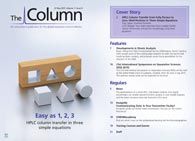Gyula Vigh Receives Arnold O. Beckman for Separation Techniques
Gyula Vigh, Emeritus Professor of Chemistry and inaugural holder of the Gradipore Chair in Separation Science at Texas A&M, has been awarded the Arnold O. Beckman Award for Outstanding Scientific Achievements in the field of electrodriven separation techniques sponsored by Sciex Separations, a division of AB Sciex (Massachusetts, USA).
Gyula Vigh, Emeritus Professor of Chemistry and inaugural holder of the Gradipore Chair in Separation Science at Texas A&M, has been awarded the Arnold O. Beckman Award for Outstanding Scientific Achievements in the field of electrodriven separation techniques sponsored by Sciex Separations, a division of AB Sciex (Massachusetts, USA).
Professor Vigh’s research is focused on both the theoretical and practical aspects of high performance chromatographic and electrophoretic separation methods. He joined Texas A&M University in 1985 where he served two terms as Chairman of the Analytical Division in the Department of Chemistry. In 2001, he was appointed to Texas A&M University’s Gradipore Chair in Separation Science. He has graduated 34 PhD students, published 178 papers, and obtained 5 US patents. In 2011, he received the Hungarian Society for Separation Sciences (HSSS) Halász Medal Award recognizing research excellence in the separation sciences, before retiring in 2013. The award was presented on 28 April 2015 at the 31st International Symposium on Microscale Bioseparations in Shanghai.
For more information please visit: www.sciex.com

New TRC Facility Accelerates Innovation and Delivery
April 25th 2025We’ve expanded our capabilities with a state-of-the-art, 200,000 sq ft TRC facility in Toronto, completed in 2024 and staffed by over 100 PhD- and MSc-level scientists. This investment enables the development of more innovative compounds, a broader catalogue and custom offering, and streamlined operations for faster delivery. • Our extensive range of over 100,000 high-quality research chemicals—including APIs, metabolites, and impurities in both native and stable isotope-labelled forms—provides essential tools for uncovering molecular disease mechanisms and exploring new opportunities for therapeutic intervention.
New Guide: Characterising Impurity Standards – What Defines “Good Enough?”
April 25th 2025Impurity reference standards (IRSs) are essential for accurately identifying and quantifying impurities in pharmaceutical development and manufacturing. Yet, with limited regulatory guidance on how much characterisation is truly required for different applications, selecting the right standard can be challenging. To help, LGC has developed a new interactive multimedia guide, packed with expert insights to support your decision-making and give you greater confidence when choosing the right IRS for your specific needs.

.png&w=3840&q=75)

.png&w=3840&q=75)



.png&w=3840&q=75)



.png&w=3840&q=75)









